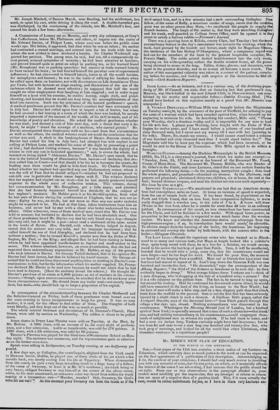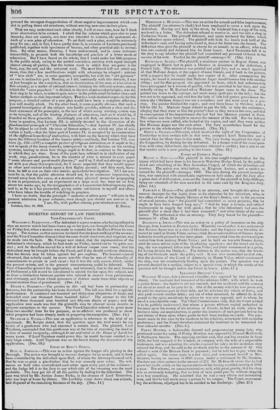Ma. BIBER'S NEW PLAN OF EDUCATION.
TO TIIE EDITOR OF THE SPECTATOR.
Stn,—Your paper of the 11th inst. contains a short notice of my Lectures on Education, which certainly does as much justice to the work as can be expected, on the first appearance of a publication of that description. Acknowledging ask I do, the candour of your criticisms, I should feel very much averse to troubling': you with any remarks of mine, but for one point, on which, as it materially affects! the interest of the cause I am advocating, I feel anxious that the public should be set right. From one or two observations in the paragraph alluded to, your readers must infallibly get the impression, that my attempts at reform in educa- tion are more of a negative than of a positive kind. This, if it were actually the' case; would be rather unfortunate for me) as I have in these very Lectures ex.
'pressed the strongest disapprobation of :those negative improvements which con. sist in ptilling down old structures, without erecting new ones in their place.
That we may understand each other clearly, I will at once state, how far T think 'your observation to be correct. I admit that the volume which gave rise to your
remarks, does not contain, nor ever was intended to contain, the systematic de- tails of a new plan of education. To set forth such a plan, would he extremely easy for me; and, in fact, I have partly done it, in a course of Lectures previously 'published, together with specimens of lessons, and other practical aids to instrue- iion. By other means, likewise, I have endeavoured, and in some instances successfully, to promote both the knowledge and practice of a better mode of :'education. But I have found on the whole, that I could make but little progress 'in the public mind, owing to the settled conviction, existing with equal strength
'almost among all parties, that the beaten track in which they are going is the 'best, nay, the only and the universal road. The most liberal will not admit any 'More, than that a few modifications might with advantage be adopted ; patches 'of " hew cloth" are, in some quarters, acceptable, but with the "old garment" no one is inclined to part. Meeting, as I did, continually with this obstacle, I was at last brought to the conviction, thet an investigation of the state of education in this country, as a matter of national interest, bringing the different systems, among
'which the aura popnlaris" is divided, to the test of universal principles, was the
.• first step to be taken, in order to gain access in the public mind for better views and better Methods on that important subject. That in a work destined expressly for this
purpose, a detailed outline of a new plan would have been a complete allotrWn, you will readily admit. On the other hand, it seems equally obvious, that such a general investigation of the subject was hardly possible, without a clear and dis- tinct statement of the principles, to the test of which every existing system was to be brought, and of the leading features of education, such as it would be, if founded on these princicles. Accordingly you will find, on reference to the vo- hne in question, that Lecture III. is entirely devoted to the discussion of the fundamental principle of " Christian Education,"—that Lecture IV. has chiefly for its object to set forth the view of human nature, on which my plan of edu-
cation is built,—that the latter part of Lecture VI. is occupied by an enumeration
of the different branches of instruction, with hints on the bearing which they have Upon the different faculties of the human mind,—and lastly, that Lecture VII con- tains (p. 246-257) a complete picture of rekrious instruction,as it ought to be ; not to speak of the many remarks, interspersed in the criticisms on the existing systems, tending to show how things ought to be done, in contrast to the manner in which they are done. Some of the parts here referred to in vindication of my -work, may, peradventure, be in the number of what is termed in your paper " some obscure and questionable fancies;" and if so, I shall not attempt to quar- rel with you about that expression, for I never expected that they would appear as clear and evident truths upon a first flighty perusal; and they must, there- fore, be left to rest on their own merits, upon closer investigation. All I am anx- ious for is, that the public attention should not, by an erroneous impression, be 'turned away from this cause, at a moment when practical means for propagating it are in preparation, and an experiment on a large scale has been set on foot, about ten weeks ago, by the reorganization of a Lancasterian School upon my plan, 'and is, as far as it has proceeded, giving entire satisfaction to myself and others 'who have taken the trouble of watching its progress.
I have no doubt, that the principle " audiatur et altera pars" will gain to the present admission in your columns, even though you should not concur in its
contents. I am, Sir, with perfect esteem, your obedient servant,



















 Previous page
Previous page